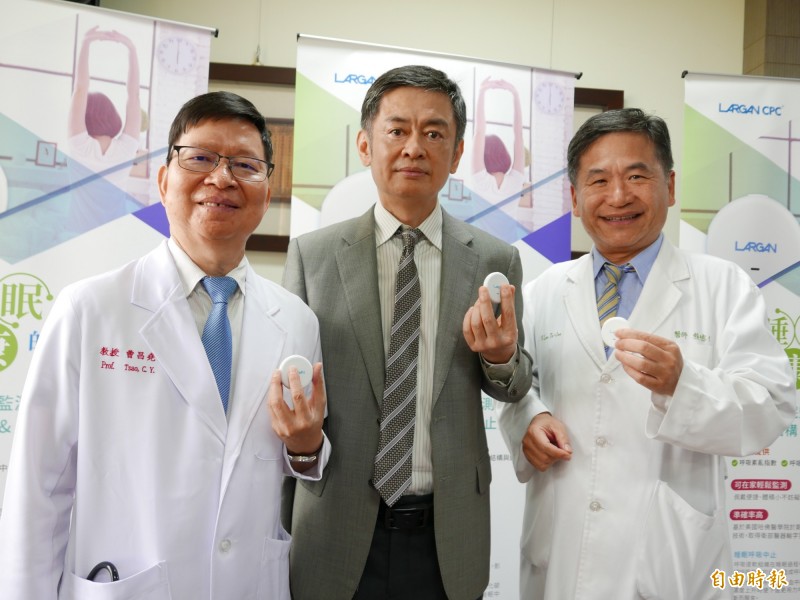
Taking sleeping pills for sleep apnea may increase the risk of fatality.
A truck driver in Taichung, who has been suffering from insomnia for 5 to 6 years and taking sleeping pills without improvement, frequently nodded off at daytime while driving. Upon seeking medical treatment last month, he was diagnosed with severe sleep apnea due to obesity. After using a positive airway pressure (CPAP) machine during sleep, there was a significant improvement in his condition. The patient is now planning to lose weight. Doctors remind that many individuals with sleep disorders may take sleeping pills by mistake. In cases of sleep apnea, self-medication with sleeping pills can deteriorate respiratory suppression and raise the risk of fatality.

Chung Shan Medical University Hospital cooperates with Largan Precision to develop a portable respiratory monitor. Doctors Lai Te-jen (right) and Tsao Chang-yao (left), along with Largan Precision CEO Lin En-ping, jointly explain the collaboration. (Photo by Cai Shu-yuan)
Lai Te-jen, the chairman of the Taiwanese Society of Psychiatry and the director of the Department of Psychiatry at Chung Shan Hospital, stated that sleep apnea includes issues such as airway obstruction, obesity, lung diseases, and abnormal central nervous system regulation. Sleeping pills have a respiratory inhibitory effect, deteriorating respiratory suppression, causing the brain to be more deprived of oxygen, leading to continuous awakenings. In severe cases, it could be life-threatening.
Tsao Chang-yao, the vice president of Chung Shan Medical University and a pulmonologist, pointed out that about 10% of the population, approximately 2.5 million people in Taiwan, suffer from chronic insomnia. The prevalence of adult sleep apnea is about 2% to 4%. In outpatient clinics, it was found that about 1/10 of sleep apnea patients would self-administer sleeping pills. The muscle relaxant effect of these drugs can worsen sleep apnea.
Chronic insomnia is generally defined as feeling unrested and sleep-deprived upon waking up for over a month. Te-jen Lai stated that solving sleep problems requires identifying the underlying causes, such as sleep apnea, lung disease, gastroesophageal reflux, or emotional disorders, for fundamental treatment. Sleeping pills are for short-term use, guiding into sleep but not necessarily ensuring quality sleep. Adjusting the sleep schedule for 1-2 days is recommended instead of relying on medication for over a week.
Chang-yao Tsao also emphasized that excessive use of sleeping pills does not help improve sleep. He shared a case of a 52-year-old woman with persistent insomnia who had taken six different sleeping pills without improvement. Further testing revealed a high amount of deep sleep (6-7 hours), constituting 70% of total sleep time, with only 15% in rapid eye movement (REM) sleep (normal is 50% deep sleep, 25% light sleep, and 25% REM sleep). The sympathetic and parasympathetic ratio was too low, indicating an overdose, leading to a state of drowsiness rather than normal sleep. After reducing the sleeping pill dosage, and with additional treatment for mild depression, her sleep problems significantly improved.
Te-jen Lai advised that to address sleep disorders, it is recommended to stay active during the day, avoid lying down too much, and reduce the consumption of stimulating beverages like coffee and tea. Emotional issues should be addressed, and relaxation techniques like yoga or meditation before bedtime can be effective. Seeking medical advice for proper use of sleeping pills under a doctor's guidance is crucial.
Regarding the examination of sleep apnea, Chang-yao Tsao mentioned that traditional sleep disorder tests require spending a night in a sleep examination room at a hospital, often involving months of waiting for an appointment. Patients are usually equipped with devices throughout their bodies, but they may not complete the test due to discomfort. Chung Shan Medical Center and Largan Precision's subsidiary, Largan Health AI Tech, have collaborated to introduce a new method this month. Patients can use a wireless recorder with a 5 cm diameter to record physiological signals such as heart rate, respiration, and body position at home. After uploading the data to the cloud system, through big data analysis, sleep disorder indices, types, causes, etc., can be interpreted. A hundred people have undergone the new-generation sleep cloud test.

